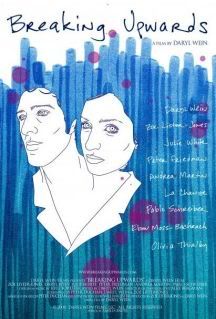 Breaking Upward (2010)
Breaking Upward (2010)directed by Daryl Wein
written by Peter Duchan and Zoe Lister Jones
starring: Zoe Lister Jones, Daryl Wein
I went into Breaking Upwards with a misapprehension which I admit is going to color this review: I thought it was a movie about polyamory. I could be excused for making this mistake. The film’s trailer shows the central couple questioning monogamy, talking about seeing other people, discussing the terms of seeing other people, going on dates, cruising Greenwich Village hipsters at a Greenwich Village hipster party together, and dealing with jealousy over interacting with other people. It has gotten some attention in the poly blogosphere, which is how I heard about it.
But Breaking Upwards definitely isn’t a film about polyamory. It is a film about Zoe and Daryl, a young, Jewish, artistic couple that live in Greenwich Village. They love each other but the passion is gone. However, they are so co-dependent that neither one can take the blow of instant separation so they concoct a novel scheme of progressive separation. They begin by spending three days a week apart from each other, then tentatively begin seeing other people. They quickly start to notice other people and let them into their lives, causing a number of conflicting feelings. Daryl helps Zoe hit on a man at a party but is jealous about her casual sex with an actor. When he sleeps with his writer boss and a new acquaintance, Zoe asks not to be given the details.
Their arrangement perplexes their parents. Daryl’s mother is left out of the loop (leading to some destructive prying) but Daryl’s father seems to quietly understand what his son is going through. We get the feeling from certain remarks Daryl makes about his parents’ marriage that his dad understands what it means to love someone but not be in love with her anymore but the filmmakers never follow up so I couldn’t tell if Daryl’s insights were real or if he was too young to understand his parents yet. Zoe’s mother is much more free-spirited. She has dabbled in polyamory and takes the young couple to a meeting of middle aged poly people. The parents were the best part of the whole film, because they added some wisdom, perspective and humor to Zoe and Daryl’s melodrama.
Zoe and Daryl briefly flirt with the idea of maintaining their open relationship. He even considers turning down a career opportunity that requires him to move to Vancouver to stay with her. But his mother forces them to ask themselves if this kind of relationship can last. I’d answer yes, but the movie says no as if it’s a foregone conclusion. They don’t want a complicated open relationship that requires them to confront their feelings for each other and fly in the face of Daryl’s mother’s expectations, they choose to avoid all that drama and end it… in the middle of a Passover Seder with their families and friends looking on and participating in the recriminations. Well, so much for avoiding all that drama. Daryl decides to move to Vancouver after all and as the taxi arrives to take him to the airport he sees Zoe across the street crying and smiling and waving to him. Meaning they are no hard feelings? I’m not quite sure. It was a weird scene.
I saw the movie with my partner Annabelle River. The two of us laughed very loud at a moment in the movie when Zoe and Daryl are seen reading Fear of Flying, by Erica Jong. Annabelle liked that book while I couldn’t even finish it, and my problem with this movie was exactly the same as my problem with the book. I found it very difficult to sympathize with these people as they floundered in a problem of their own creation as if it was something that had just happened to them. Occasionally the film delivered a poignant and touching moment where I really connected with Zoe and Daryl but more often their interactions with each other and others were cold and ambiguous. I couldn’t tell why the filmmakers had included many of the scenes or what they thought I would get out of watching them. Furthermore, all of the secondary partners that Zoe and Daryl interact with were poorly developed, mere plot devices, as if making them more than clichés (a pretty girl next door, a horn dog who bolts after sex, etc.) would bring up questions the filmmakers didn’t want to address. For that matter, Zoe and Daryl don’t have much going on in their characters. I can’t think of a single thing I learned about either one the doesn’t have to do with their relationship, their jobs (he’s an aspiring writer, she’s an aspiring actress) and the fact they’re Jewish. The parents were developed much better and I suspect that had more to do with good acting than good writing.
So to sum up, Breaking Upwards is well made and feature some great actors. It has some nice moments and some beautiful footage of Greenwich Village at its most charming. Despite this, the characterization and story are mostly a yawn. The film poses some interesting questions about alternative ways to set up relationships and then ignores them. If the filmmakers had been interested in exploring the answers, their film would have been much more interesting.
No comments:
Post a Comment